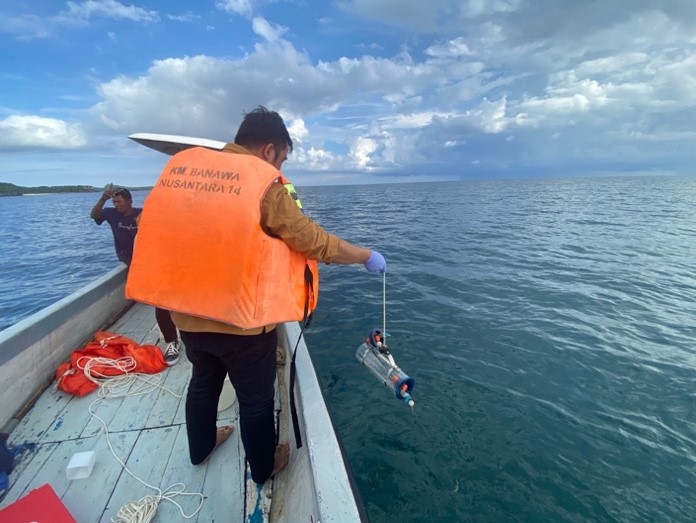Oil spills in the ocean are a major environmental problem. These spills pollute coasts and estuaries, while also posing serious health risks to humans. While massive and catastrophic spills attract the most attention, smaller and chronic spills actually occur on a regular basis.
To support effective responses to oil spill incidents, a training session was carried out by the Team for Mitigation of Pollution and Damage to the Marine Environment in the Waters Area of the Province of East Nusa Tenggara (NTT). The meeting formed part of the group’s action plan, namely Training and Technical Consultation on Guidelines for Monitoring and Sampling of Oil Spills.
Held from 22–23 November 2022 in Kupang, NTT, the training was attended by a total of 26 participants. The first day covered the theory of sampling, while the second day involved practical examples of water sampling techniques. After the water sampling practical exercise on the second day, the Oil Spill Monitoring and Sampling Guidelines were presented.
The guidelines presented at the training contained information that can help ensure that monitoring and sampling activities are prepared in response to an oil spill. The guidelines focus on monitoring and using sampling tools, both during the early phase of an incident and as it escalates.
Especially in the initial phase of the spill, monitoring and sampling are vital to effective oil spill response. Ondy Christian Siagian, the Head of the NTT Province Environment and Forestry Service and also the Head of the Team for Combating Pollution and Damage to the Marine Environment delivered the opening remarks reflecting on the incident of the Montara oil spill in 2009. “The lack of alertness in carrying out monitoring and sampling at the beginning of the incident until the fragments of the oil spill entered the coast of the NTT territorial waters caused difficulties in submitting claims for compensation for environmental damage due to the oil spill,” he emphasised.

The training activities were guided by Ichsan Prayoga Ardiansyah, who provided material on technical sampling of water (especially seawater), air and solids as a component in monitoring and sampling oil spills at sea. He noted that it is important to analyse these three components as evidence of an oil spill, by checking their levels and calculating the likely magnitude of the impact. Of the three components, seawater sampling is the highest priority, because it is the most polluted component.
The training participants, as well as members of the Team for Mitigating Pollution and Damage to the Marine Environment in the Waters Area of the Province of NTT, provided inputs on improving the guidelines that had been prepared, so that they can be utilised by working groups in the future. The ATSEA-2 Project will continue to support the improvement of the guidelines, so that NTT Province can respond to the threat of oil spill pollution at sea more effectively.
By Khaifin


